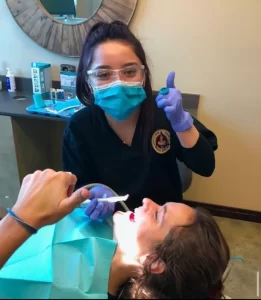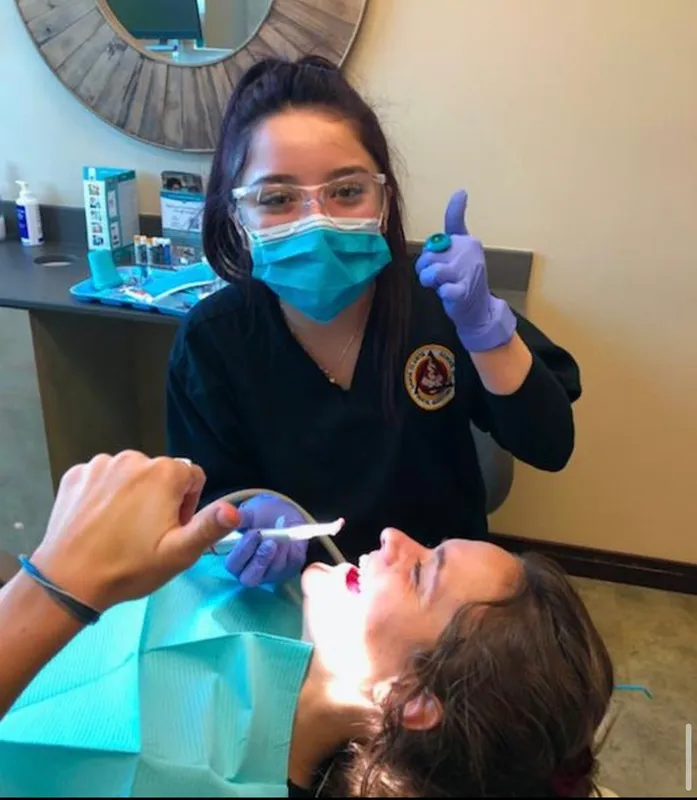Dental Assistant to Dental Hygienist
Many of our students graduate as dental assistants and end up falling in love with their career. However, many do aspire to enroll into a dental hygiene school and become a dental hygienist. Some spend a few years dental assisting before deciding to take the plunge. In fact, many of our students have taken this path.

Getting accepted into a dental hygiene program is competitive. Additionally, according to the American Dental Education Association, it’s not uncommon to have a tenth of a percentage point separating you from the next qualified applicant. Having a background as a dental assistant will help you stand out.
Do Dental Assistants Make Better Dental Hygienists?
Having a background as a dental assistant, with work experience in a dental office is beneficial. For example, 46% of accredited dental hygiene programs use previous dental office experience as one of the criteria in the admissions process.
Further, we find that many of our dental assistants have been successfully admitted into dental hygiene programs. In fact, one of our recent graduates was just accepted into a dental hygiene program.
Below, is a quick video of her journey.
What is a Dental Hygienist?
An RDH is a licensed dental professional who is part of the dental care team. Moreover, their duties include services like oral examination, oral prophylaxis (scaling, root planning, soft tissue curettage and polishing teeth). Also, they expose and process dental x-rays, administer local anesthesia and nitrous oxide sedation for pain control. As well as instruct patients in oral disease control and nutrition.
Dental Hygienist Education Requirements.
All programs require different prerequisites. Therefore, we strongly recommend looking into the program you’re trying to apply for and ask what their prerequisites are. You can attain an associate’s degree, a bachelor’s degree or a master’s degree.
If you ever want to become a teacher for either Dental Assistants or Dental Hygienists, we encourage getting a bachelor’s degree. You need to attend an accredited school that has been approved by the Commission on Dental Accreditation.
Below are the four main subjects you’ll learn:
- General Education – Oral and written communication, psychology, and sociology.
- Dental Hygiene Science – Oral health education and preventative counseling, health promotion, patient management, community oral health, medical and dental emergencies, infection and hazard control, clinical dental hygiene, and more.
- Dental Science – Tooth morphology, oral embryology and histology, oral pathology, radiography, periodontology and more.
- Biomedical Science – Anatomy, physiology, chemistry, biochemistry, microbiology, immunology, pathology, nutrition, pharmacology.
Licensure Requirements for Dental Hygienists
Requirements differ from state to state. Although, we believe California is the best state…because we live here! In fact, some states offer alternate paths to licensure. For more information, please contact your state board and ask for information regarding licensure and possible alternate paths, should your state offer them.
Dental Hygienist license Renewal
How often a hygienist needs to renew their license, will differ from state to state. For example, in California each licensee must renew their license every two years by the last day of the month of their birthday.
Benefits of Being a Dental Assistant First.
- You’ll be able to get hands on experience working in the dental field in as soon as 12 weeks.
- You can work with hygienists and observe what their work life is like.
- Asking the hygienists in your office for advice and feedback is a huge plus.
- You will have an easier time understanding the material in a hygiene program as you will have worked with hygienists.
- You’ll be able to see if being a hygienist is truly what you want. You might decide that you are content with being a dental assistant, you might want to explore other areas of dental assisting.
Conclusion
At Santa Clarita School of Dental Assisting, we have trained many dental assistants, a good deal of them have gone on to become dental hygienists. Therefore, if you have any questions about dental assisting, how to get started or anything of the sort, please feel free to contact us! We’re happy to answer any of your questions. Hope this article was informative and helpful.
